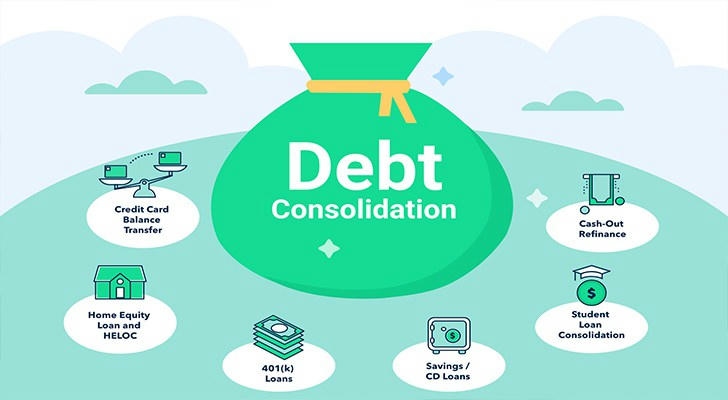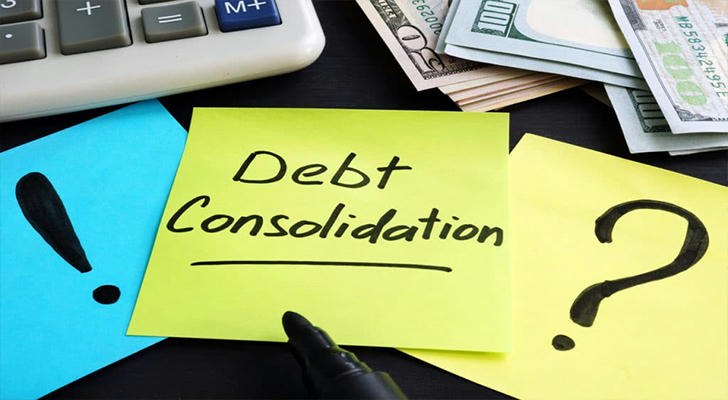Debt-Free in Less Time: See How Debt Consolidation Can Help!
Struggling with multiple debts can be overwhelming. Juggling various payments, interest rates, and deadlines may cause stress and financial strain. If this sounds familiar, a debt consolidation plan could be the solution you're looking for. Debt consolidation combines your outstanding debts into a single, manageable payment, helping you streamline your finances and potentially reduce the total amount you owe.

What is Debt Consolidation?
Debt consolidation involves taking out a new loan or using a financial service to combine your existing debts into one single monthly payment. Instead of keeping track of several different debts—each with its own interest rate and due date—you only have one loan to manage. This can make repaying your debts simpler and less stressful, especially if you're struggling to keep up with various bills.
How Does Debt Consolidation Work?
The concept behind debt consolidation is straightforward: you take out a consolidation loan, which is used to pay off your outstanding debts (such as credit cards, medical bills, or personal loans). This leaves you with one consolidated debt to pay off, typically at a lower interest rate and with a fixed monthly payment.

There are a few common ways to consolidate debt:
1.Personal Loan: You can apply for a personal loan with your bank or another lender, which you then use to pay off your debts.
2.Balance Transfer Credit Card: Some credit cards offer promotional balance transfer rates, where you can move all your credit card balances to a new card with a 0% interest period for a set time.
3.Home Equity Loan: If you own a home, you may be able to use a home equity loan or line of credit to pay off your debts. However, this involves putting your home as collateral, so it carries more risk.
4.Debt Consolidation Service: Some companies offer debt consolidation services, where they negotiate with your creditors and help you create a repayment plan.
Benefits of Debt Consolidation

1.Simplifies Your Payments
Managing one debt payment is much easier than handling multiple payments each month. You no longer need to worry about juggling different due dates or missing a payment. This reduces stress and helps you stay organized.
2.Lower Interest Rates
High-interest credit cards can make it difficult to make a dent in your debt. By consolidating your debts into a loan with a lower interest rate, you can save money over time and pay down your principal balance more quickly.
3.Fixed Repayment Schedule
Many debt consolidation plans offer fixed monthly payments, so you know exactly how much you'll need to pay each month and when you'll be debt-free. This can help you plan your budget more effectively and give you a clear timeline for paying off your debt.
4.Improves Your Credit Score
Debt consolidation can help improve your credit score in the long run, especially if you're able to make your new payments on time. Reducing the number of active debts and paying off your consolidated loan consistently can positively impact your credit score over time.
How Debt Consolidation Can Help You Get Debt-Free Faster
1.Focusing on One Loan
When you consolidate, your attention shifts to just one loan instead of multiple debts. This gives you a clear focus, allowing you to concentrate on paying off the balance instead of feeling scattered between various loans.
2.Less Interest Accumulation
With high-interest debts, a significant portion of your monthly payments may go towards interest rather than reducing your principal balance. Debt consolidation can lower your interest rate, meaning more of your payments will go towards paying down the principal, reducing the total repayment period.
3.Boosts Financial Discipline
A debt consolidation plan often comes with a structured repayment schedule, encouraging better financial discipline. By adhering to this schedule, you're more likely to avoid accumulating new debt and can focus on paying off your consolidated loan.
4.Avoid Late Fees
Late fees and penalties for missed payments can add up, making your debt situation worse. By consolidating your debt, you're less likely to miss payments, reducing the risk of late fees and helping you get out of debt faster.
Is Debt Consolidation Right for You?
Debt consolidation isn't a one-size-fits-all solution, so it's essential to assess whether it’s the right option for your financial situation. Here are a few factors to consider:
1.Your Debt Level
If you have significant high-interest debt from multiple sources, consolidation could be a good way to streamline your payments and lower your interest rate. However, if your debts are manageable, you may not need a consolidation loan.
2.Credit Score
Your credit score will play a significant role in determining whether you qualify for a consolidation loan and what interest rate you'll receive. If your credit score is low, you may not be able to secure a favorable rate, and other options like working directly with creditors may be better.
3.Commitment to Repayment
Debt consolidation is only effective if you're committed to repaying the consolidated loan. If you continue to rack up new debt after consolidating, it could worsen your financial situation. It's important to use consolidation as part of a broader plan to improve your financial health.
4.Fees and Costs
Some consolidation options, like balance transfer credit cards or debt consolidation loans, may come with fees. Be sure to read the fine print and calculate whether the savings on interest will outweigh any fees associated with the consolidation plan.
Steps to Get Started
If you’re ready to take control of your debt and pay it off faster, here are a few steps to get started:
1.Evaluate Your Debts: List all of your current debts, including the balances, interest rates, and minimum monthly payments.
2.Research Your Options: Look into different consolidation methods, such as personal loans, balance transfer cards, or debt consolidation services.
3.Check Your Credit Score: Knowing your credit score will help you determine which options you qualify for and what interest rate to expect.
4.Choose a Plan: Once you’ve found the right consolidation option, apply for the loan or service that fits your needs.
5.Stick to Your Repayment Schedule: After consolidating, make sure to follow your repayment plan and avoid taking on new debt.
Case Study: The Thompson Family's Debt Consolidation Journey
• Background: Mark and Lisa, both in their early 30s, found themselves overwhelmed by multiple debts, including credit card balances totaling $15,000 with interest rates averaging 22%, a personal loan of $5,000 at 18%, and a car loan of $10,000 at 7%. Juggling these payments was stressful, and they often struggled to make ends meet.
• Decision to Consolidate: After researching their options, the Thompsons decided to pursue debt consolidation. They realized that managing multiple payments each month was not only confusing but also costly due to high interest rates. They sought advice from a financial advisor who recommended consolidating their debts into a single personal loan.
• Personal Loan: The Thompsons applied for a personal loan of $30,000 with a local bank at an interest rate of 10%. This loan would allow them to pay off all their existing debts.
• Paying Off Debts: With the funds from the personal loan, they paid off their credit cards and personal loan immediately, leaving them with just one monthly payment to manage.
• Simplified Payments: Instead of managing three separate payments with varying due dates and interest rates, Mark and Lisa now had one fixed monthly payment of approximately $650 for the next five years.
• Lower Interest Rate: By consolidating their debts into a loan with a lower interest rate (10% vs. an average of 22%), they significantly reduced the amount of interest they would pay over time. This allowed more of their monthly payment to go toward paying down the principal rather than just covering interest.
• Improved Financial Discipline: With a structured repayment plan, they felt more motivated to stick to their budget and avoid accumulating new debt. They also set up automatic payments to ensure they never missed a due date.
• Long-Term Impact: Over the next five years, Mark and Lisa remained committed to their repayment plan. They successfully paid off the personal loan ahead of schedule by making extra payments whenever possible. As a result, they not only became debt-free but also improved their credit scores significantly by maintaining on-time payments and reducing their overall credit utilization ratio.
The Thompson family's experience highlights how effective debt consolidation can be in managing financial stress and achieving long-term financial health. By consolidating their debts into one manageable payment at a lower interest rate, they simplified their finances, reduced their overall debt burden, and regained control over their financial future. If you're struggling with multiple debts like Mark and Lisa were, consider exploring debt consolidation as a viable solution to help you achieve financial freedom.
Conclusion
Debt consolidation can be a powerful tool to help you get out of debt faster and more efficiently. By simplifying your payments, lowering your interest rate, and focusing on paying off one loan, you can regain control of your finances and work towards becoming debt-free. Whether you're juggling high-interest credit card debt or struggling to manage multiple loans, a debt consolidation plan can give you the fresh start you need. Take the first step today, and see how debt consolidation can help you achieve financial freedom.
